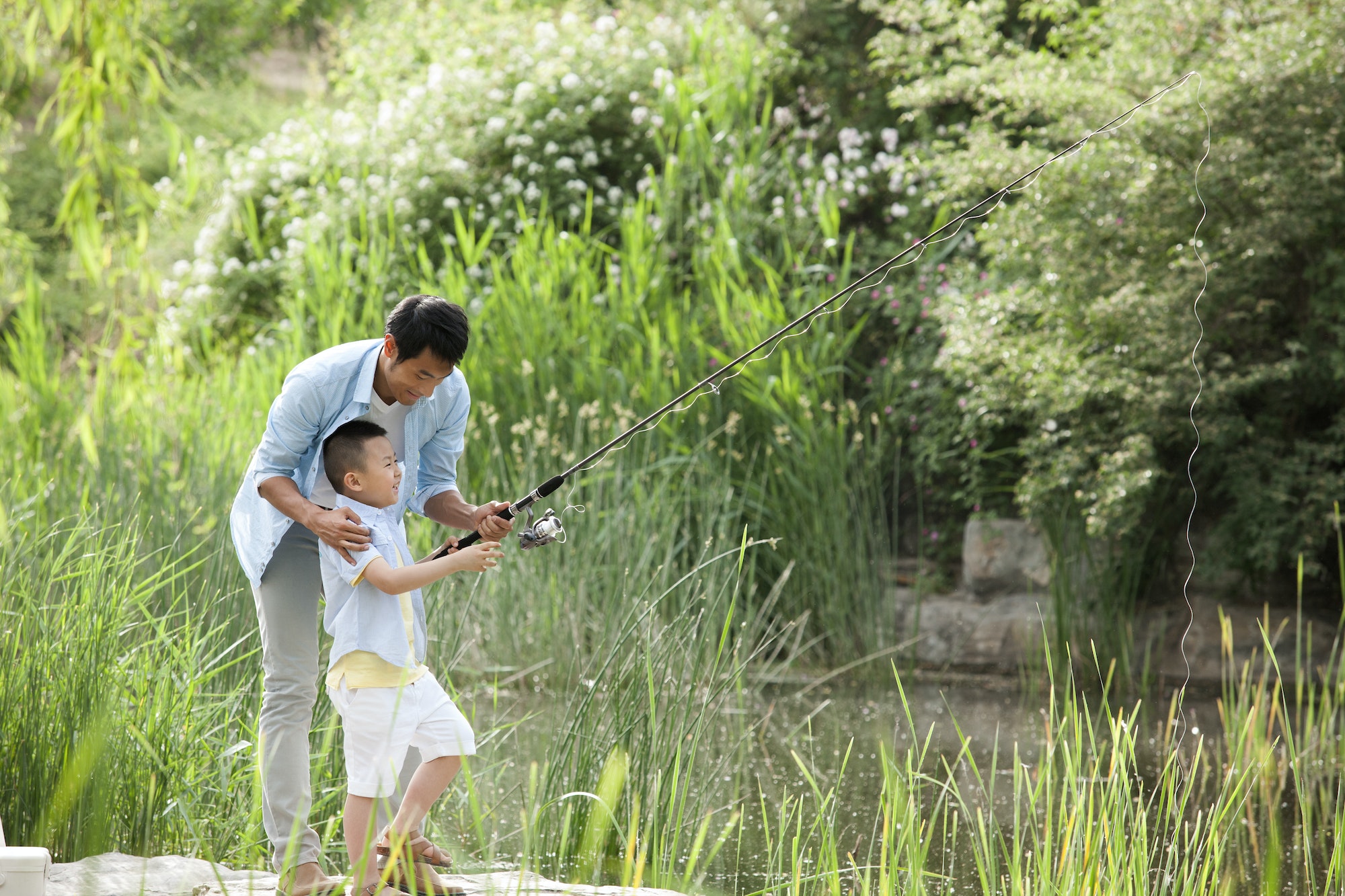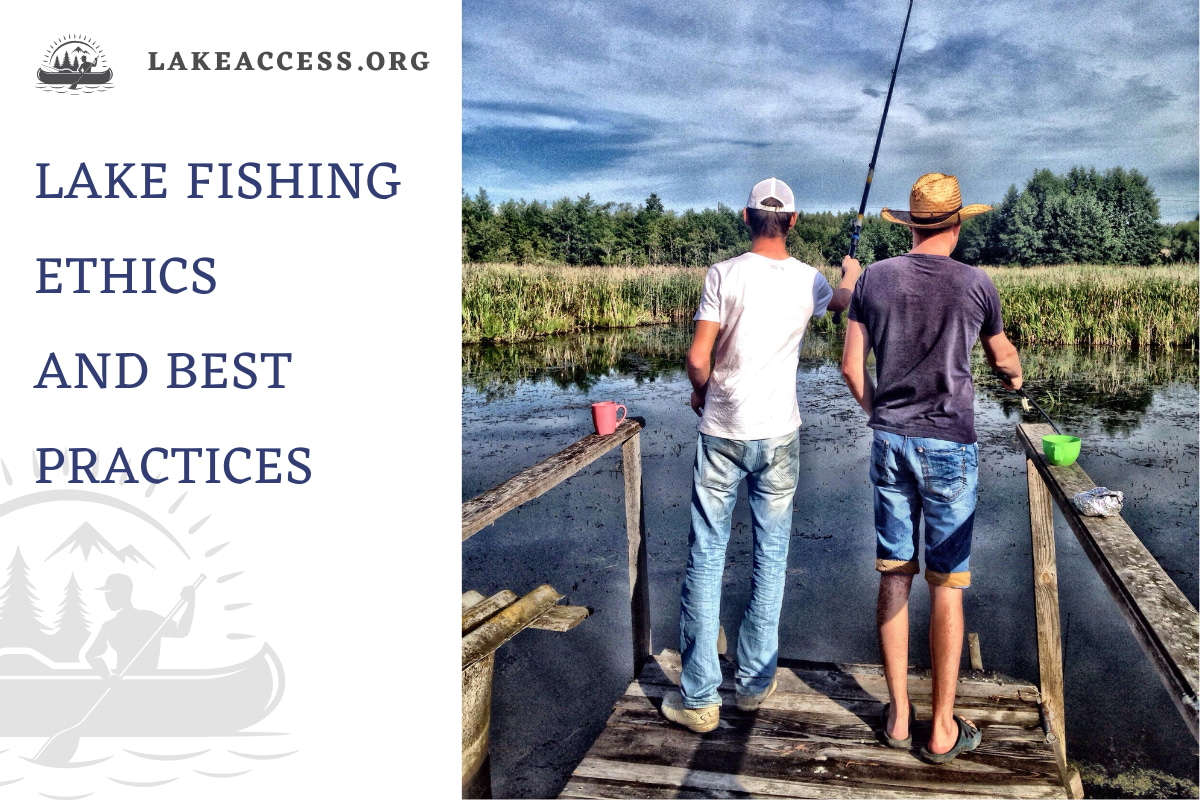It is crucial to follow lake fishing ethics in order to protect our natural resources and the environment. Fishing ethics help to ensure that the fish population remains healthy, that habitat are respected and not disrupted, and that the fish we catch are eaten and not wasted. Proper fishing etiquette also means respecting other anglers, following laws and regulations, and not crowding or casting over other’s lines. In addition, following conservation practices such as catching and releasing and respecting bag and size limits are essential for the future of fishing. Without following lake fishing ethics, our waters could become damaged or over-fished, leading to a decrease in fish population and the enjoyment of the sport for future generations.
Best Lake Fishing Ethics and Practices
Practice Catch and Release
Catch-and-release fishing is an essential and ethical practice when fishing on a lake. It has been used to conserve fish stocks for over a century to prevent certain species from disappearing. By practicing catch-and-release fishing, we can ensure that the fish population does not become overfished and can continue to thrive in the lake. It is essential to practice catch and release when the water temperature is near or above 70 degrees, as the mortality rate will be high. Additionally, if you are going to release a fish, it is essential to do it successfully, as releasing a fish that dies due to improper handling is a waste. To ensure you release a fish successfully, you should never squeeze it and cradle it with your hand under its belly.
Always adhere to the fishing regulations
It is ethically important to always follow fishing regulations to help protect the environment and ensure that our fish populations remain healthy for future generations. Fishing regulations guide responsible angling practices that help conserve natural resources and preserve sensitive habitats. Following the regulations, we can ensure that only the legally allowed amounts of fish are kept, that foreign bait is not used, and that spawning fish are handled carefully. We can also help reduce crowding and preserve the tranquility of the fishing experience by avoiding overcrowding and keeping noise to a minimum.
Be respectful of other fishers
When lake fishing, it is important to be respectful of other fishers and practice good fishing etiquette. Some tips for being respectful include reviewing regulations before heading out for the day, keeping only as many fish as legally allowed and that will be eaten, and not using exotic bait species. Additionally, it is important to handle spawning fish with care, have permission from landowners to fish on private property, give others a wide berth, and keep noise to a minimum so as not to spook the fish—lastly, practice catch and release when appropriate and never contaminate water bodies or shorelines with litter.
Be respectful of the environment
Respecting the environment when fishing is important to ensure the sustainability of our natural resources and the enjoyment of fishing for future generations. Responsible conservation practices can help ensure that fish populations remain healthy and fishing opportunities remain for all anglers. Some ways to be respectful of the environment when fishing include:
- Packing out what you pack in.
- Avoiding power boating through rooted aquatic vegetation.
- Learning proper catch and release techniques.
It is also important to know and follow the fishing regulations and laws in the area, as well as to be mindful of sensitive habitats and avoid disturbing spawning fish. Following these practices can help maintain a positive angling community and ensure that our fishing experiences remain enjoyable and rewarding.

Use Barbed Hooks Responsibly
When lake fishing, using barbed hooks responsibly is an ethically important practice that all anglers should be mindful of. Single, barbless hooks are the most fish-friendly hooks to use in order to reduce the amount of damage dealt to the fish’s mouth and minimize the chance of infection and permanent tears. If a barbed hook is necessary, anglers can use forceps to pinch the barb, which will help reduce the time that the fish spend out of the water and the associated damage from holding it to pull the barb out.
Properly Dispose of Fishing Line
Properly disposing of fishing lines is essential for the health of our waters and the aquatic life that inhabit them. Here are some step-by-step instructions on how to properly dispose of fishing line:
- Cut the line into smaller pieces, if possible. This will help the line to break down quicker and more easily.
- Collect the line in a sealable plastic bag or container.
- Find a local recycling center that accepts fishing lines. If there is no local recycling center that takes fishing lines, contact the local waste management company to see if there is a special program in place.
- Drop off the sealed bag or container of fishing line at a designated recycling bin, or take it to your local recycling center.
- If you are not able to take the line to a proper recycling center, you can tie it up and leave it in a central location for collection.
Avoid Overfishing
If you’re an angler looking to avoid overfishing, the best way to do so is by becoming an ethical angler. This means applying responsible fishing conservation practices such as reducing your fish consumption, catching fish one by one abiding by your state laws, looking for the “pole and line” label when trying to buy “fresh” fish at the supermarket, and avoiding eating cooked fish out as there isn’t any labeling for you to know the supply chain. Additionally, you could try pivoting into different industries, such as outdoor activities that don’t involve exploiting fish, or, if you’re vegetarian/vegan, consider omitting consuming fish and other aquatic animals altogether.
Use appropriate fishing gear
It is important to use appropriate fishing gear when fishing to ensure the safety of the fish and its environment. Using heavier tackle and leader and tippet of the highest weight that will allow you to catch fish reduces the time of the fight and increases the survival rate of the fish. Landing nets should be used rather than lifting the fish with hands, as it supports the whole body of the fish when lifting it out of the water and reduces damage. It also gives a safe place to revive a fish if necessary. In addition, using the right fishing gear will help reduce the number of broken lines, hooks, and weights left in the fish’s mouth and reduce the contamination of the waterway. By using the appropriate fishing gear, anglers can also be courteous to other anglers and protect the environment by limiting their catches and never contaminating the water.
Practice Safe and Humane Handling
Handling a fish humanely is important for ethical reasons. When handling a fish, it is essential to take care not to cause undue stress or injury. If a fish is to be killed, it should be done quickly and decisively to minimize the animal’s suffering. If a fish is to be released, it should be returned to the water immediately. It is also essential to consider the impact of fishing on other aquatic species, such as dolphins and turtles, which anglers and commercial fishing operations can harm.
Use Ethical Bait and Lures
Using ethical bait and lures when fishing is vital to protect the environment and maintaining fish populations. By using bait and lures native to the fishing area, you ensure that you are not introducing any foreign species that could disrupt the ecosystem. Likewise, by using bait and lures that are not harmful to the fish and aquatic life, you ensure that the fish remain healthy and that the lake or river remains in equilibrium.
Share your knowledge with others
Sharing knowledge is an essential tool for improving lake fishing ethics. Anglers can get valuable information from local bait and tackle shops, experienced fishing guides, conservation organizations, sporting stores, and fly fishing shops. By getting insider information from sources like these, anglers can learn about the target species, the best bait or lure to use, and the best locations for that particular fish. Additionally, anglers can learn about best catch and release practices and conservation methods to protect the fish in their lake. By learning and sharing this information, anglers can become more responsible and knowledgeable about their fishing practices, which can help to ensure the health of the lake’s fish population.

FAQ
How can anglers minimize fish mortality rates?
Anglers can minimize fish mortality rates by following certain best practices, such as using the heaviest leader and tippit possible to fool fish, avoiding fishing in warm water and the hottest parts of the day, and keeping the fish immersed in water until species and size are identified. Anglers should also be respectful of fish, the environment, and other users when fishing and obey fishing regulations to help preserve fisheries. When taking a photo, anglers should never lift the fish high and should limit the time out of the water. Using larger landing nets can also help minimize mortality rates.
What are the best practices for fishing conservation?
Fishing conservation involves being respectful of the environment, taking care of our natural resources, and being respectful of other anglers. Some of the best practices for fishing conservation include not keeping more fish than you and your family can eat; learning proper catch and release techniques; packing out what you pack in and picking up any litter you see while on the water; knowing the fishing regulations in the state and waterways you plan to fish; avoiding powering through rooted aquatic vegetation; respecting fish and treating them humanely; preventing the transfer of aquatic species or weeds from one water body to another; never contaminating water bodies or shorelines with litter; practicing courtesy toward other anglers and respecting their rights; leaving natural areas as you found them and keeping campsites clean; and supporting fishing regulations and obeying the law.
What types of bait should be used for lake fishing?
When it comes to lake fishing, the type of bait used will depend on the species being targeted. For panfish such as bluegill, live crickets are a great option as they are small and easy to hook. For bass or catfish, earthworms make good bait since they are durable and can provide a substantial meal. Lures such as jigs and small spinnerbaits are also a good choice, as they can be effective even in murky water where fish may be more challenging to spot. Finally, flies and other artificial baits can target trout, salmon, and other species. No matter which type of bait is used, use the heaviest line and leader possible for the species, as this will help ensure a successful and safe catch.
What are the potential consequences of overfishing?
The potential consequences of overfishing are vast and far-reaching, impacting entire ecosystems and the species within them. Overfishing can lead to a decrease in the size of fish and changes in their reproductive and maturity rates. This can cause an imbalance throughout the entire food web, leading to a loss of other meaningful marine life, including vulnerable species like sea turtles and corals. In addition, since overfishing removes primary food sources, it can also decrease biodiversity. Globally, about one-third of all assessed fisheries have been pushed beyond their biological limits due to overfishing, reducing fish stocks. This can also lead to bycatch from fishing, which causes the needless loss of billions of fish, turtles, and cetaceans. Furthermore, overfishing can result in economic hardship for local fishing communities and decrease food security for billions of people who rely on fish for protein.
What are some standard courtesy rules for anglers?
Standard courtesy rules for anglers include:
Treating fish and the environment with respect, following fishing regulations.
Only keeping as many fish as you can eat.
Using legal bait.
Handling spawning fish with care.
Obtaining permission from landowners when fishing on private property.
Being mindful of noise levels and avoiding crowding.
Giving other anglers space.
Anglers should also be mindful of transferring aquatic species or weeds from one waterbody to another and never contaminate waterbodies or shorelines with litter. Lastly, anglers should practice courtesy and respect toward other anglers and share the water with other users.

